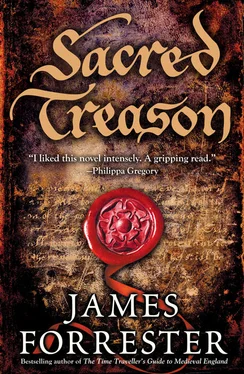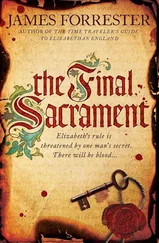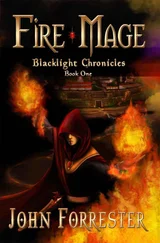James Forrester - Sacred Treason
Здесь есть возможность читать онлайн «James Forrester - Sacred Treason» весь текст электронной книги совершенно бесплатно (целиком полную версию без сокращений). В некоторых случаях можно слушать аудио, скачать через торрент в формате fb2 и присутствует краткое содержание. Жанр: Исторический детектив, на английском языке. Описание произведения, (предисловие) а так же отзывы посетителей доступны на портале библиотеки ЛибКат.
- Название:Sacred Treason
- Автор:
- Жанр:
- Год:неизвестен
- ISBN:нет данных
- Рейтинг книги:4 / 5. Голосов: 1
-
Избранное:Добавить в избранное
- Отзывы:
-
Ваша оценка:
- 80
- 1
- 2
- 3
- 4
- 5
Sacred Treason: краткое содержание, описание и аннотация
Предлагаем к чтению аннотацию, описание, краткое содержание или предисловие (зависит от того, что написал сам автор книги «Sacred Treason»). Если вы не нашли необходимую информацию о книге — напишите в комментариях, мы постараемся отыскать её.
Sacred Treason — читать онлайн бесплатно полную книгу (весь текст) целиком
Ниже представлен текст книги, разбитый по страницам. Система сохранения места последней прочитанной страницы, позволяет с удобством читать онлайн бесплатно книгу «Sacred Treason», без необходимости каждый раз заново искать на чём Вы остановились. Поставьте закладку, и сможете в любой момент перейти на страницу, на которой закончили чтение.
Интервал:
Закладка:
“Go with God, Mr. Clarenceux.”
Thomas unbolted and opened the door. Machyn put his hand on the frame to steady himself, then stepped out into the rain and darkness.
2
Henry Machyn found himself once more in Fleet Street, in the dark. He shuffled across to the houses on the far side to get out of the rain. He felt tired. The cold bit into his face and hands and he leaned heavily on his stick. When he reached the overhanging jetty of a house, he paused. He was safe for the moment.
Lightning flashed across the angled roofs of the houses fronting the street. A moment or two passed, then the thunder came. There was no let-up to this downpour.
I should have accepted Mr. Clarenceux’s invitation to stay.
He blinked, water dripping from his eyebrows. No. I did the right thing. It is too dangerous now.
He stood still, with one hand against a wall and the other on his stick. All his plans ended with Clarenceux and the chronicle. Where to go now? He could not go back home. He needed to find somewhere he could rest, somewhere dry. He could sleep anywhere, he was so tired.
But a glimmer of satisfaction warmed him. He had done it. The book was in the hands of the most intelligent, conscientious, and dignified person he knew. A man who could defend himself and had powerful friends. Straining his old eyes, he saw the line of the roof of the herald’s house. And up there, on the first floor, there was a chink of yellow light between the shutters: the candle on the elm table. His book was lying beside that candle. Mr. Clarenceux would soon read it. Before long he would read the end-and then he would know.
Despite Richard Crackenthorpe’s threats, the book was secure. No royal sergeant-at-arms would dare search the house of a herald, surely. Whatever happened to him now, his part in this act was done. The burden he had borne for the last twenty-six years had been lifted from his shoulders.
3
Clarenceux stood in the hall, leaning over Machyn’s book, which lay open on the table. The Cronacle of Henrie Machine, marchaunt-ttayler amp; parrish clerke of Holy Trinitie ye Lesse was scrawled in a very uneven hand across the top of the page. Beneath it was the first line of the first entry, in an equally unsteady script: The xiij day of juni 1550 did Ser Arthur Darse knyghte John Hethe paynter amp; Hare Machyn marchaunt mete… A line or so later he read, amp; aftre to Paull’s crosse wher we harde a godly sermon by ye gode bysshope of Dorham.
Clarenceux stared at the first paragraph. It was not just the writing which was appallingly bad; the spelling was awful. He had never seen such a badly written manuscript. Machyn had meant that he and his friends, Sir Arthur Darcy and John Heath, had “heard a goodly sermon by the good bishop of Durham.”
He turned the page. The next entries were much the same. On the right-hand side was an entry about the earl of Southampton’s funeral in August of the same year. Machyn had provided the ceremonial velvet and the black cloth to drape the church, as well as the banners used in the funeral procession. No doubt it had been one of his commissions as an undertaker. That was how the two of them had met: Clarenceux had been the herald at a funeral for which Machyn had provided black cloth and heraldic escutcheons.
He reminded himself of the hardworking ethic of his friend. Machyn was entirely self-taught and intensely aware of his lack of formal education. That made him humble, self-knowing, and perceptive of frustrated desires in others. He was a good man in every way. Clarenceux had no right to criticize his writing. Many men of Machyn’s standing could not read or write at all.
He cast his mind back over what he knew of Henry Machyn and his brother Christopher. They had come to London as boys, from Leicestershire, early in the reign of King Henry the Eighth. They had both completed apprenticeships and become members of the Company of Merchant Taylors. Both had been moderately successful. Christopher had owned six or seven shops when he died. Henry’s ambitions had been more spiritual and historical. It was wholly fitting that the prized possession of this self-educated tradesman should be not a line of tenements but a finely bound chronicle filled with his own humble lettering.
“Sir,” said Thomas, standing in the middle of the hall, not far from his bed, “may I ask, will you be staying up? Would you like me to stack the fire?”
Clarenceux looked over his shoulder and glanced first at Thomas, then at the fireplace. Then he remembered the date that Machyn had given him: June 20, 1557.
“Wait,” he murmured, going back to the book. He turned the pages and started looking at the entries.
The xix day of June…The x day…The xiii day… Even the dates were in the wrong order. For a moment he thought that Machyn had made a mistake. But he soon realized that the entries had simply been jumbled up. They had been copied into this book from preliminary notes. There were almost no crossings out.
Then he saw it, toward the bottom of the page. He read the entry silently at first, tracing the scrawl.
The xx day of Junj dyd pryche my lord abbott of westmynster at Powlls crosse amp; mad a godly sermon of dyves amp; Lazarus amp; ye crossear holdyng the stayffe at ys prechyng amp; ther wrer gret audyense boyth the mayre amp; juges amp; althermen amp; mony worshipfull.
He lifted the book, holding it in the light of the candle, and turned to his servant. “What do you make of this, Thomas? This is what Henry has written under the date that he told me to remember. It reads: ‘The twentieth day of June did preach my lord abbot of Westminster at St. Paul’s Cross, and made a goodly sermon of Dives and Lazarus, and the crosier held the staff at his preaching; and there was a great audience, both the mayor and judges and aldermen and many worshipful.’ There it ends. All I can think of is that he meant ‘worshipful men.’ I was there that day.”
“Respectfully, sir, even if you were there, I do not understand why that is so extraordinary.”
“Nor do I, Thomas. Nor do I.” Clarenceux glanced again at his servant. He looked tired. “No, Thomas, I will not need a fire. Go back to bed. I am sorry you were disturbed.”
Thomas nodded his thanks. But he did not move.
“Yes?”
“Sir, it was a relief to me…that it was Goodman Machyn.”
“I know. I feared the same.”
There was a deep silence. The thought of being paraded in chains to the Tower once more passed across Clarenceux’s mind.
“Good night, Thomas.”
“Good night, Mr. Clarenceux.”
Clarenceux snuffed out one candle, left one on the table for Thomas, and took the last with him up the stairs to his study. He shut the door behind him and put the book on his table board. He pulled his furred robe back around him, put a felt cap on his head, and sat down. Once more he opened the book and began to read.
4
Henry Machyn’s arms ached; so too did his legs. With an awkward, painful twist of his wrist between the planks of the fence, he touched the latch, turned it, and unfastened it. He pushed the gate, which creaked open. Picking up his stick, he heaved himself forward into the yard, chilled to the bone. He stepped into a puddle but did not care at all, since his feet were already too soaked for it to make any difference. He did not even bother to lock the yard gate behind him. All that mattered to him was that he was heading to a place to rest his head in the dry. If it was the last thing he ever did, he wanted to lie down in the warm.
He stepped forward, stumbling, reaching out with one hand, feeling for the stable door. It was further than he remembered. At last it was there, wet wood beneath his fingers. Water ran down his face as he moved along, feeling for the handle. He found it. But the door was shut fast. No! Please, no-let it open. Let me find some rest here . His fingers caught on the edge of the frame and ran slowly up the edge. They felt a wooden swivel latch and undid it.
Читать дальшеИнтервал:
Закладка:
Похожие книги на «Sacred Treason»
Представляем Вашему вниманию похожие книги на «Sacred Treason» списком для выбора. Мы отобрали схожую по названию и смыслу литературу в надежде предоставить читателям больше вариантов отыскать новые, интересные, ещё непрочитанные произведения.
Обсуждение, отзывы о книге «Sacred Treason» и просто собственные мнения читателей. Оставьте ваши комментарии, напишите, что Вы думаете о произведении, его смысле или главных героях. Укажите что конкретно понравилось, а что нет, и почему Вы так считаете.












